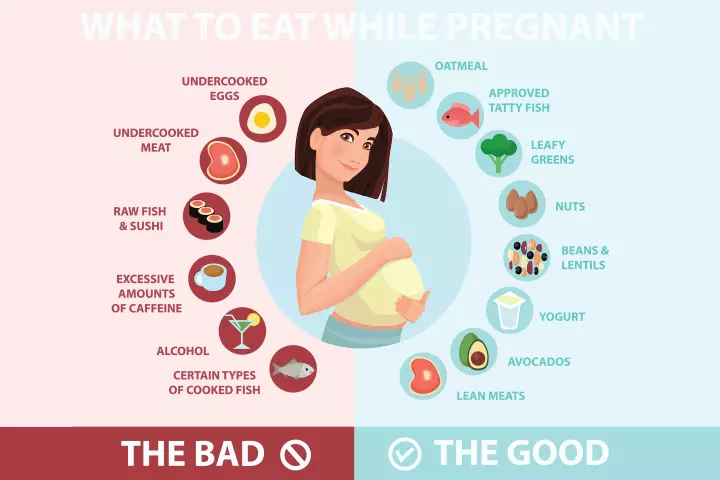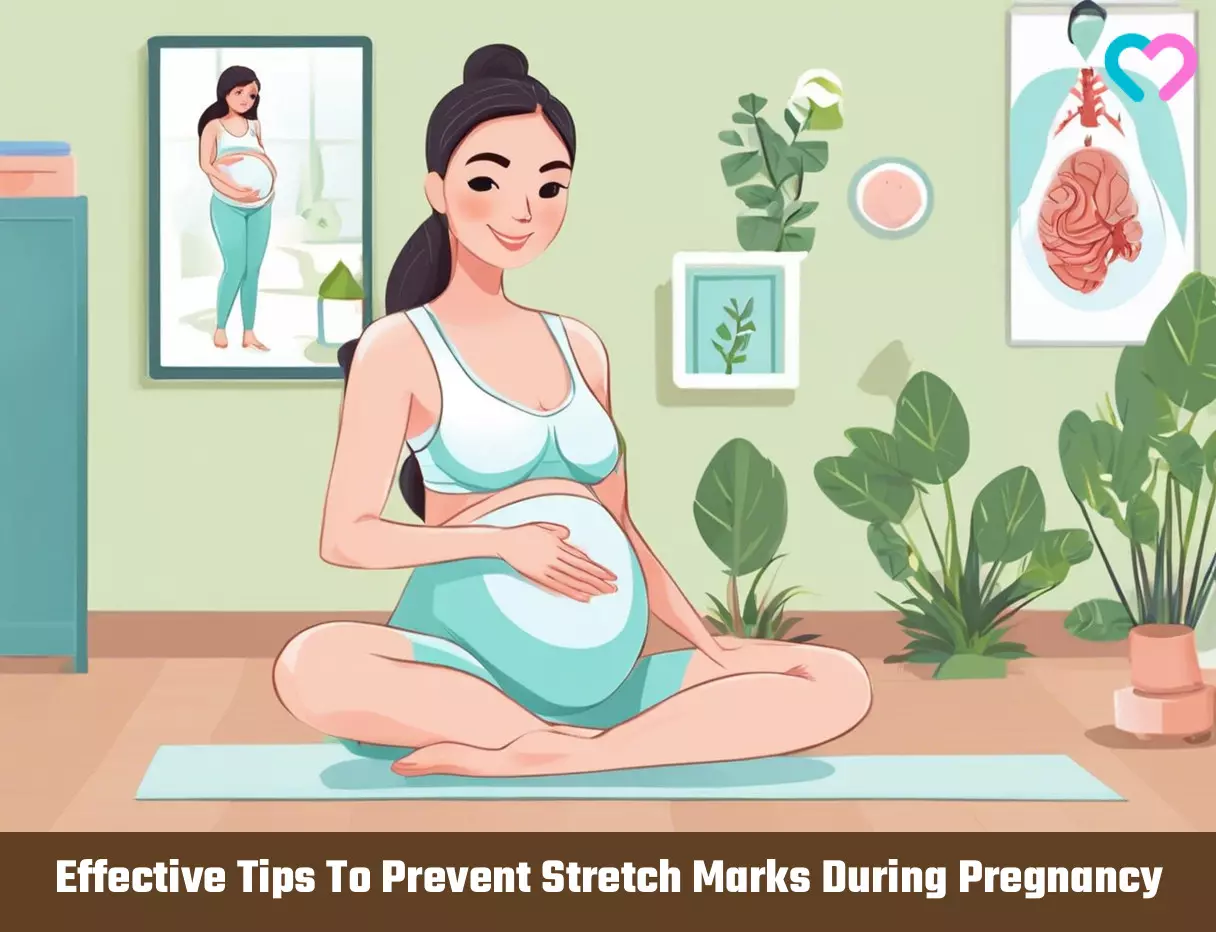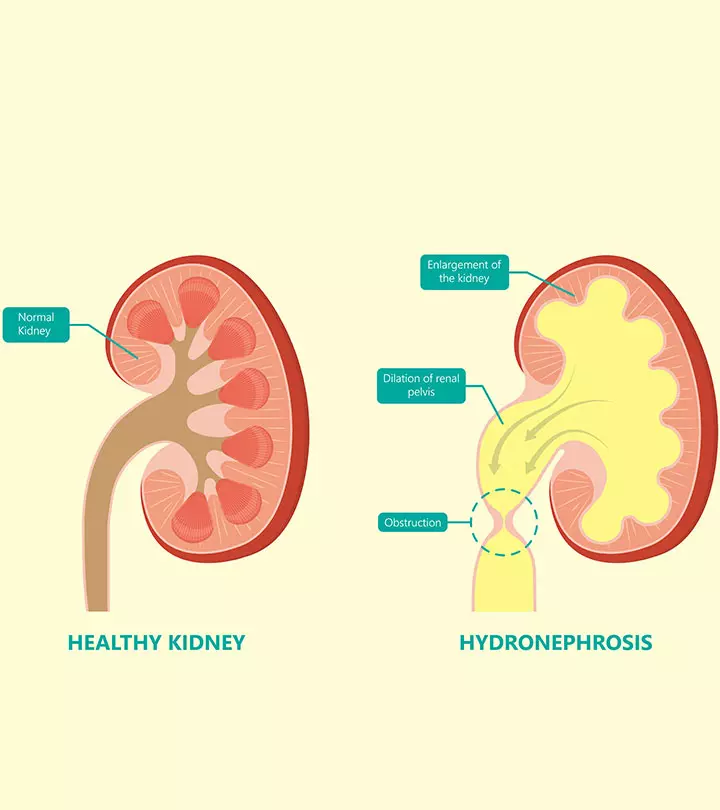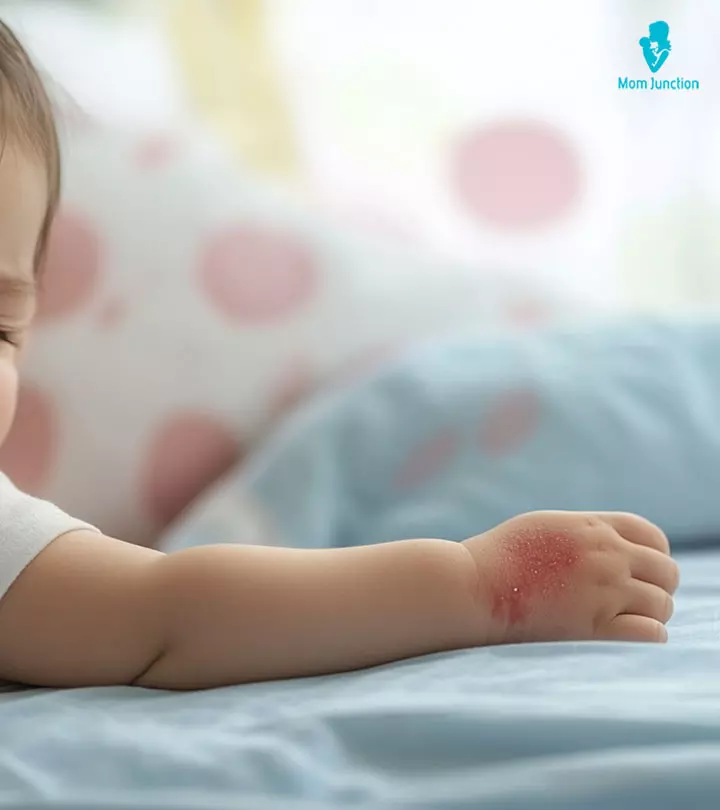
Image: Shutterstock

Stretch marks are part and parcel of your motherhood journey. While most women embrace them, preventing stretch marks when pregnant is a preferable option for some and is completely normal. Stretch marks are pregnancy-related changes that cause small tears of the elastic supportive tissue beneath the skin and often appear as purple, reddish-brown, or dark brown streaks, depending on the skin color (1).
Around 90% of women develop stretch marks during pregnancy. They occur due to stretching of the skin on the belly, breasts, hips, and buttocks (2).
Read on to learn about the causes, possible treatments, and preventive measures for stretch marks.
Key Pointers
- Pregnancy stretch marks may occur with the stretching skin and increasing pregnancy hormones.
- Stretch marks are evident in the later stages of pregnancy, while some may find them earlier with expanding belly.
- Eating the right foods, getting enough exercise, and skin care can help prevent stretch marks.
- Vitamin E oils, olive oil, bio-oil, etc., help reduce or fade off the stretch marks.
What Are The Causes Of Stretch Marks During Pregnancy?
Some possible risk factors responsible for causing stretch marks are (3):
- Physical stretching: The body expands during pregnancy, and as a result, skin starts to stretch. Continuously expanding and stretching will not give the skin enough time to recover and adjust to the changes. Therefore, the skin begins to tear and scar, forming stretch marks.

- Hormones: The increasing pregnancy hormones draw extra water into the skin that helps relax the bonds of collageniA structural protein that helps build the connective tissue, skin, bones, and tendons and provides body flexibility. fibers. It can make the skin prone to tear when stretched, resulting in stretch marks.
- Heredity: Although not specific to pregnancy, stretch marks may be genetic. If your mother had stretch marks, you are likely to develop them during your pregnancy (4).
Are Stretch Marks Painful Or Dangerous?

Stretch marks do not pose a threat to the baby or the maternal health. However, they are often accompanied by itching (3) (5). Although common, researchers state that stretch marks during pregnancy could cause anxiety, self-consciousness, and depression in some women (6). Proper prenatal care and timely attention could help manage these emotional concerns.
In Which Trimester Do You Develop Stretch Marks?
Pregnant women are most likely to develop stretch marks towards the second and third trimesters
. Although stretch marks begin as soon as the belly starts to expand, they become distinct by the sixth or seventh month of pregnancy (2) (3).
How To Prevent Stretch Marks When Pregnant?
You may follow the below self-care and body-care tips for preventing stretch marks when pregnant:
- Control your weight. Try to maintain a healthy weight of around 25 to 35 pounds with a balanced diet. A steady and healthy weight gain can help reduce the occurrence or intensity of stretch marks (5) (7). Aim to get regular physical activity and consult your healthcare provider to create a personalized weight gain plan tailored to your needs.
- Stay hydrated. Drinking at least two liters of water per day and staying hydrated can help rejuvenate and strengthen the skin (3).
- Have a nutrient-rich diet. Our skin contains collagen and elastin fibersiComponents of the elastin protein that provides strength and elasticity to the body structures. , which help tighten the skin when stretched (skin taut). A strong skin taut is less likely to tear and scar. Include a diet rich in zinc, vitamins C and E, and silica, as these nutrients help form collagen, repair tissue damage, and promote pregnancy wellness. In addition, vitamins B2 and B3 are important for skin health (3).

- Include exercise. Regular exercising as a part of a healthy lifestyle can increase circulation and enhance skin elasticity (3).
- Protect the skin. Besides hydration and exercise, you can also keep your skin supple by regular moisturization. You may apply bio-oil and gently massage your body twice daily, from the first trimester, to keep the skin hydrated and improve its elasticity (3).
A 34-week pregnant mother, Monika, shares her observations regarding skin changes. She notes, “So far – knock on wood – I have not noticed any stretch marks anywhere on my body – but I also realize I may still get them mere weeks before delivery, so I guess we will just have to wait and see. As far as body care, I have been using lots of moisturizers on the bump & rump area every single evening after showering, sometimes in the morning as well. I also like to scrub and massage my body quite thoroughly in the shower, using lots of body wash and a loofa to get some good blood circulation and exfoliate all those dead skin cells… When it comes to the actual products I’ve been reaching for, I have not bought a single anti-stretch mark cream or belly balm or any of those other lotions and potions geared specifically towards pregnant women… I think for me personally, body butters and oils are the way to go (i).”
 Things to know
Things to knowWhat Are The Possible Treatments For Stretch Marks During Pregnancy?
Although there is no proven cure for stretch marks, some treatments can lighten and reduce their intensity considerably. These include:
- Topical medication: Prescribed medications containing hyaluronic acidiA substance secreted in the body that helps retain volume and moisture in the skin. , trofolastin, and tretinoin might work for stretch marks. Topical application has shown significant improvement in discoloration of the stretch marks, making them faint in appearance (2). Massaging the skin with the above creams for around six months could work (8).
 Caution
Caution
- Lotions and oils: Topical creams or body oils containing vitamin E can treat pregnancy stretch marks. Moisturizing the skin with cocoa butter, shea butter, bio-oil, and olive oil can eventually fade the marks or reduce their occurrence (2).
- Medical procedure: Post-pregnancy cosmetic treatments such as laser therapy, microneedling, radiofrequency, and energy-based devices may be recommended by your healthcare provider. Laser therapy and microneedling enhance collagen production and reduce the blood flow to the stretch mark lesions (2) (9).
- Early treatment: Most dermatologists recommend treating stretch marks when they appear. You can also consult with your obstetrics and gynecology expert about the possible treatment options (7).
When Do Stretch Marks Go Away?
Stretch marks may not completely disappear but become unnoticeable with time. For most women, stretch marks after pregnancy may turn pale white or silver and irregular in shape (3).
Frequently Asked Questions
1. Who is more prone to stretch marks in pregnancy?
Women who gain more weight than the recommended average gradual weight gain are likely to develop stretch marks in pregnancy. Also, expecting moms whose mothers had stretch marks during pregnancy are more likely to develop them (10). Presumably, young expectant mothers are susceptible to stretch marks because they have firmer skin.
2. Does coconut oil prevent stretch marks in pregnancy?
Coconut oil may reduce inflammation, which may help alleviate stretch mark appearance. However, no studies have shown that including coconut oil in your pregnancy skincare can help prevent stretch marks.
3. What surgery gets rid of stretch marks?
According to the American Society of Plastic Surgeons, the tummy tuck is a procedure that can surgically remove stretch marks below the belly button. During this surgery, the excess skin below the belly button is permanently removed, and the upper skin is used to tighten the abdomen for a smoother appearance (11).
It is common to notice changes in the body during pregnancy. Some noticeable changes, such as stretch marks, are gentle reminders of your pregnancy journey and are common among pregnant women. However, they are not serious and disappear with time. Meanwhile, you can try the above tips and measures to manage the condition.
Infographic: Safe Compounds For Stretch Marks Treatment
Stretch marks are common during pregnancy as the skin stretches to accommodate the growing baby. While several products may treat stretch marks, you must check if their ingredients are pregnancy-safe. Check out the infographic below to learn about some common ingredients that are safe to use during pregnancy.
Some thing wrong with infographic shortcode. please verify shortcode syntaxIllustration: Effective Tips To Prevent Stretch Marks During Pregnancy

Image: Stable Diffusion/MomJunction Design Team
As your pregnancy progresses, stretch marks become more evident due to the stretching of the belly. Learn how to treat and prevent these stretch marks and keep the skin looking healthy and beautiful.
Personal Experience: Source
MomJunction articles include first-hand experiences to provide you with better insights through real-life narratives. Here are the sources of personal accounts referenced in this article.
i. Skin and body in pregnancy: My experience & products I use.https://rocaille-writes.blogspot.com/2016/08/skin-and-body-in-pregnancy-my.html
References
- What causes stretch marks during pregnancy.
https://www.acog.org/womens-health/experts-and-stories/ask-acog/what-causes-stretch-marks-during-pregnancy - What your skin should expect when you’re expecting.
http://www.health.harvard.eduwww.health.harvard.edu/blog/what-your-skin-should-expect-when-youre-expecting-202010272307 - Pregnancy stretch marks.
https://americanpregnancy.org/healthy-pregnancy/pregnancy-concerns/what-are-pregnancy-stretch-marks/ - Pregnancy: stretch marks, itching and skin changes.
https://www.mottchildren.org/health-library/aa88316 - What can I do about stretch marks?
https://www.tommys.org/pregnancy-information/im-pregnant/ask-midwife - Pregnancy stretch marks cause stress and emotional burden, study finds.
https://www.michiganmedicine.org/health-lab/pregnancy-stretch-marks-cause-stress-and-emotional-burden-study-finds - Are pregnancy stretch marks preventable?
https://www.piedmont.org/living-real-change/are-pregnancy-stretch-marks-preventable - Stretch marks: why they appear and how to get rid of them?
https://www.aad.org/public/cosmetic/scars-stretch-marks/stretch-marks-why-appear - B. Farahnik et al. (2017). Striae gravidarum: Risk factors, prevention, and management.
https://www.ncbi.nlm.nih.gov/pmc/articles/PMC5440454/ - Are pregnancy stretch marks preventable?
https://www.piedmont.org/living-real-change/are-pregnancy-stretch-marks-preventable - What are stretch marks and what can you do to get rid of them?
https://www.plasticsurgery.org/news/blog/what-are-stretch-marks-and-what-can-you-do-to-get-rid-of-them - Imam Budi Putra et al.; (2025); Skin Changes and Safety Profile of Topical Products During Pregnancy.
https://www.ncbi.nlm.nih.gov/pmc/articles/PMC8884185/
Community Experiences
Join the conversation and become a part of our nurturing community! Share your stories, experiences, and insights to connect with fellow parents.
Read full bio of Dr. Ben Abbes Taarji Hicham
Read full bio of Aneesha Amonz
Read full bio of Rebecca Malachi
Read full bio of Reshmi Das

 Point to consider
Point to consider
















